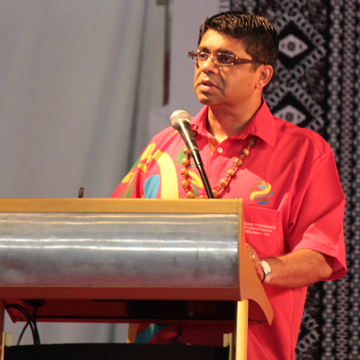IUCN applauds ‘ten key actions’ for Pacific conservation
IUCN applauds the declaration of ‘ten key actions’ made today by high-level representatives from government, the private sector and civil society at the 9th Pacific Islands Conference on Nature Conservation and Protected Areas.

Photo: IUCN
The representatives met on Thursday in a closed session of the conference and included the Prime Minister of Cook Islands, Hon. Henry Puna, Palau’s Minister of Natural Resources, Environment and Tourism, Hon. F. Umiich Sengebau, the Minister in Assistance to the President of the Republic of the Marshall Islands, Mr. Tony deBrum and Fiji’s Minister of Environment and Attorney General, Mr. Aiyaz Sayed-Khaiyum.
The ‘ten key actions’ are recognized by the high level representatives as the overriding measures that must be undertaken by Pacific Island Countries and Territories and partners in order to deliver on our conservation commitments by 2020.
“If we do not take on a whole-of-society approach, we have very little chance of meeting targets such as the Aichi Biodiversity Targets of the Convention on Biological Diversity,” says Mr Taholo Kami, Regional Director of IUCN's Oceania Regional Office.
“The ten key actions make it very clear that we have to take extraordinary action if we are to make a difference,” he said.
Addressing the conference today, Mr Sayed-Khaiyum emphasized the need for action saying “we are not interested in simply making grand announcements that are not achievable or are never implemented”.
He further expressed Fiji’s commitment to furthering the cause of responsible environmental management in the Pacific by announcing that Fiji will host a more focused high-level meeting no later than April 2014 to follow up on the outcomes of the conference.
The ten key actions cover critical areas such as ecosystem-based adaptation, food security, capacity development, long-term financial mechanisms and private sector engagement.
The conference ended today and gathered more than 600 delegates from the conservation community, academia, government and non-government agencies, development partners, international organizations and local communities across the region.



